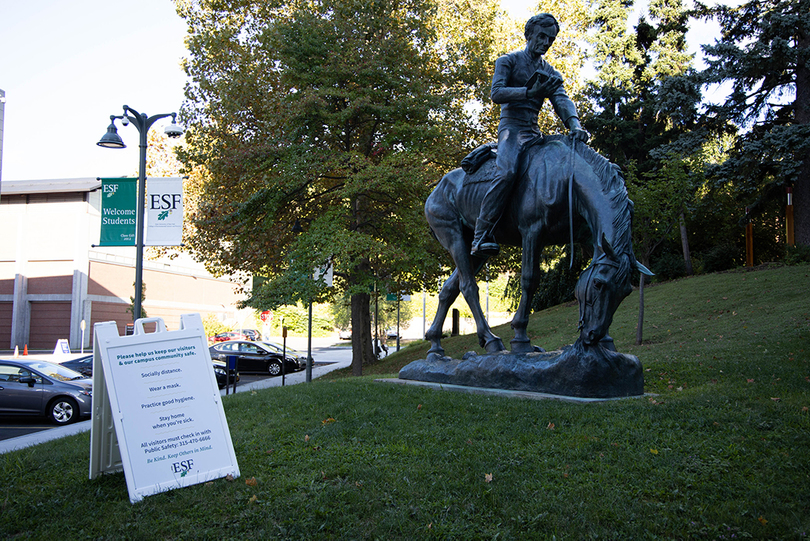What SUNY-ESF’s spring semester COVID-19 procedures are

Sarah Lee | Asst. Photo Editor
ESF pushed the start of the spring semester back to Feb. 8 to align with Syracuse University’s updated calendar. ESF students began returning starting on Jan. 29.
The Daily Orange is a nonprofit newsroom that receives no funding from Syracuse University. Consider donating today to support our mission.
SUNY-ESF has implemented new policies and restrictions for its spring 2021 semester to prevent the spread of COVID-19.
The college has kept many of its fall policies in place but has also added new ones to align with updated state guidelines and newfound challenges presented by the pandemic, such as requiring weekly testing, adjusting move-in quarantine procedures and delaying the start of the semester.
The university coordinated with the Onondaga County Health Department as well as the Centers for Disease Control and Prevention to create the policies.
“Effective guidelines are only as good as our commitment to them,” said John Wasiel, an environmental health and safety monitor at the university. “The ESF community has a history of demonstrating adherence to our plans and testing programs.”
ESF pushed the start of the spring semester back to Feb. 8 to align with Syracuse University’s updated calendar. ESF students began returning starting on Jan. 29.
Upon their return to campus, students from New York and bordering states were asked to quarantine seven days prior to their move-in date. Students also completed a daily pre-screening survey about their travel and COVID-19 history as well as any symptoms that could be related to the virus. The university recommended that students receive a flu vaccination if they will access any Syracuse University facilities throughout the semester.
SU required its students to receive a flu vaccination.
ESF required students from noncontiguous states to receive a negative COVID-19 test within 72 hours of departure from their home state as part of New York state travel policies. These students then took an additional COVID-19 test at the end of a four-day quarantine period.
More stories about SUNY-ESF COVID-19 procedures:
- SUNY-ESF campus in Adirondacks establishes strict COVID-19 safety measures
- SUNY-ESF students must test negative for COVID-19 before leaving for break
- SUNY-ESF outlines COVID-19 response plan, testing protocol worries students
The move-in process kept students socially distant, with no more than 70 students moving in per day, according to the university. Students were permitted to have one guest assist with move-in who had to leave after the three hour move-in period concluded.
“I liked how the move-in times were all scattered,” said ESF student Christine Kieres.
Students from New York and bordering states moved in between Feb. 1 and Feb. 6, and were required to have a negative COVID-19 test result within five days before their arrival to campus. They were also tested again upon arrival.
Students living off campus followed similar steps, depending on their state of origin.
Similar to the fall 2020 semester, ESF will host some classes online and others in person to ensure that students can maintain social distancing.
The university will also require students to get tested once a week if they will be on campus regularly. Students can use SU’s testing center in the Carrier Dome for their weekly tests.
In the fall, ESF established the Acorn Emergency Assistance Fund for the fall semester to provide grants using funds allocated by the CARES Act, according to the school’s website. On Jan. 31, ESF received more than $2 million in higher education emergency relief funds, granted to public and nonprofit institutions through the federal relief bill. The university must allocate about $800,000 for student aid.
As the semester continues, Wasiel said that ESF will continue to update its policies alongside guidance from local and national health authorities.
“We are pleased to have students back on campus and excited to report that the guidelines and requirements for students to return to campus were solid,” Wasiel said.





